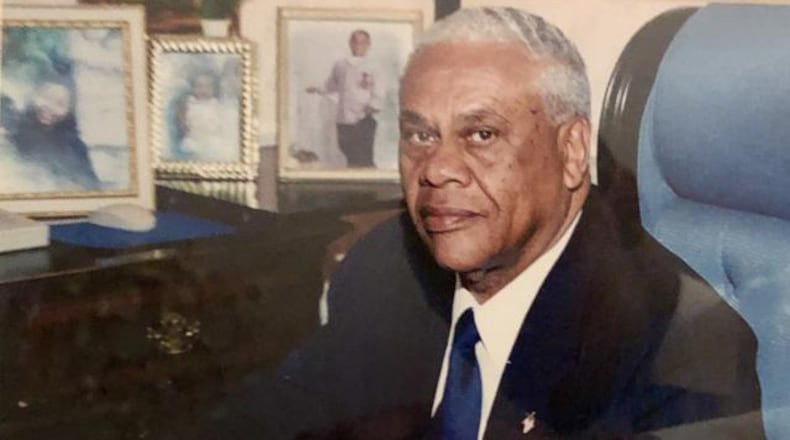Gus Thornhill Jr., owner of an East Point funeral home and longtime community activist, died Tuesday at 78.
His son, Michael Thornhill, said his father died at the funeral home while “watching his cowboy pictures.”
Thornhill was one of East Point’s first black police officers, joining the force in 1965. He rose to the rank of major before his retirement in 1990, according to the Gus Thornhill’s Funeral Home website.
He started the funeral home in 1979, said his son.
In 2000, the East Point City Council recognized Thornhill by renaming a street after him.
The younger Thornhill said his father had not been ill.
Visitation will be held at 3 p.m. Sunday at Siloam Church International, 3695 Roosevelt Highway in College Park.
Services will be held at noon Monday at the church, where Thornhill was a trustee.
Meanwhile, officials and close friends took time to remember Thornhill.
East Point Mayor Deana Holiday Ingraham called him a pillar and trailblazing pioneer in the community.
“ He was a well-respected businessman and servant leader who truly loved our community,” she said in a statement posted on Facebook. “He served and stood in the gap for many by providing resources, services and over $275,000 in scholarships to our youth. The works he's done and the legacy he leaves really speak for him and will continue to inspire and permeate throughout the City of East Point.”
Dick Donovan, the Paulding Judicial Circuit district attorney, started working as a patrolman at the East Point police department in 1971.
Not long after he arrived, Thornhill was promoted to detective and later sergeant.
He recalled Thornhill would sometimes talk about being one of the first African Americans on the force.
“He said it was really very difficult because he was told by the chief, ‘Don’t stop a car that has white people in it,’” Donovan said.
Thornhill was assigned to what was then the predominantly black section of the city.
Thornhill joined the force with his childhood friend George Clifford Burnette, who was also black. Burnette was killed on the job a few months later.
Sometimes, he told Donovan, they would leave the station and not get very far when they were called back by the chief or the mayor who “wanted to show them off.”
Outside of police work, though, Thornhill loved the funeral home business and began washing hearses at another business, Walker’s Funeral Home, when he was 9, according to the Thornhill website.
“He grew up in the business,” said Donovan. “Gus once asked me to open a funeral home with him. He said he’s put his office on one end and mine on the other. He would bury all the blacks folks and I would bury all the white ones.”
Donovan said he will miss his old friend.
"I always felt he was somebody I could just pick up the phone and talk to him."
Ben Brasch contributed to this article.
About the Author
Keep Reading
The Latest
Featured



